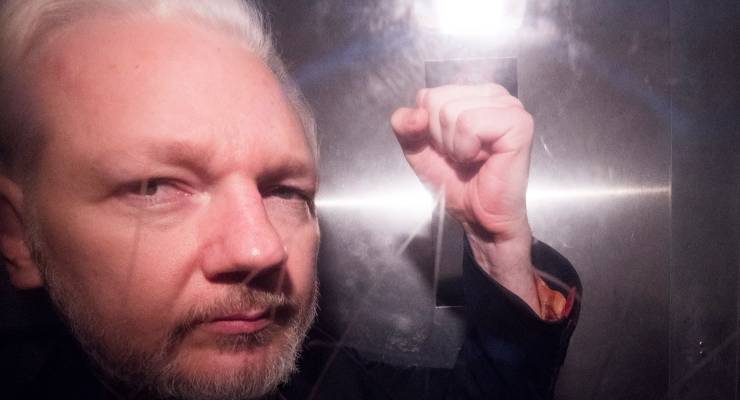
As the UK High Court takes another look at Julian Assange’s extradition case, the WikiLeaks founder finds himself at a crossroads. If the pair of judges overseeing his current application agree with his lawyers’ arguments, he’ll be allowed to continue his legal fight in the UK.
If the lawyers fail to convince the judges, his only recourse will be an appeal to the European Court of Human Rights. Assange’s wife Stella Assange told the BBC’s Today radio program the legal team would have to make that appeal within 24 hours of the court’s decision.
“This case will determine if he lives or dies, essentially,” she said.
Wednesday night, Australian time, will mark the beginning of the second and final day of arguments in the High Court hearing. Judges Victoria Sharp and Jeremy Johnson are reviewing an earlier ruling that refused Assange permission to appeal his extradition to the US.
When Assange’s lawyer Ed Fitzgerald introduced his arguments for why his client should be allowed to appeal, he began by saying Assange was being “prosecuted for political offences”.
“The prosecution is politically motivated. Mr Assange was exposing serious criminality. He is being prosecuted for engaging in [the] ordinary journalistic practice of obtaining and publishing classified information, information that is both true and of obvious and important public interest,” Fitzgerald said according to the BBC.
As the BBC’s legal correspondent pointed out, however, the team does not need to convince the judges those claims are true, they only need to convince the court Assange’s case is worthy of re-examination.
To that end, the legal team made a number of explosive claims, including that the US government had “developed a plan to try to either kill or rendition Mr Assange to the USA”.
Fitzgerald said there was “specific evidence” to support that, and added: “There is a real risk of further extrajudicial actions against him by the CIA or other agencies”.
Another of Assange’s lawyers, Mark Summers, said the alleged plot was hatched during the Donald Trump presidency, while the WikiLeaks founder was hiding from authorities in the Ecuadorean embassy in London.
The court also heard allegations of a CIA plot to spy on Assange were still being investigated by a Spanish court.
In 2022, when Crikey interviewed another of Assange’s lawyers, Australian barrister Jennifer Robinson, she said a group of lawyers and journalists had filed a lawsuit against the CIA in a Spanish court, alleging the spy service violated their constitutional rights by copying material from their phones when they visited Assange in 2017 and 2018.
Robinson, too, had been a victim of phone spying, she told Crikey at the time: “I’ve taken my own case against the British government for spying on me, which was resolved successfully with a friendly settlement where the UK admitted my rights had been violated.”
European Court of Human Rights documents showed Robinson was awarded €1000 for costs and expenses in relation to her suit against the UK.
When the UK High Court returns overnight, it will hear from lawyers for the US government, who are expected to try to punch holes in Assange’s team’s arguments.
According to the Associated Press, the US legal team said in written submissions that Assange’s actions during his work for WikiLeaks “threatened damage to the strategic and national security interests of the United States” and put people named in the leaked documents at risk of “serious physical harm”.
Assange was permitted to attend the first day in person, but the court heard he was too unwell to do so.
Ahead of this week’s hearing, Assange’s father John Shipton told Crikey the family still had hope the court would side with Assange: “Lawyers say Julian’s arguments are strong, and odds are if arguments are given their due weight and UK law is honoured, an appeals hearing will be allowed.”








Assange in Belmarsh, Navalny in Polar Wolf Prison – I assume conditions in Britain’s Belmarsh are much better than in Russia’s Polar Wolf, but if, like Alexei Navalny, Julian Assange should suddenly fall victim to ‘sudden death syndrome’ are we going to chase after assorted British and Australian Prime Ministers and US Presidents any more enthusiastically than we chase after Vladimir Putin?
And the rest elsewhere subjected to torture, but we have to drop everything for Saint Julian and his anti Clinton – Dems crusade for the Trump-Russian campaign 2016…..
If the US government was really prepared to kill Julian Assange, don’t you think he’d be dead by now?
Maybe the U.S. government is not unanimous in their desire to kill Julian Assange.
Some members of congress have stated publicly that he should be exterminated,
but not everyone agrees with them. However, it only takes one person.
Correct, where is the benefit in offing Assange? He’s a broken man.
“Pour effrayer les autres.”
Kill a chook to scare the monkeys.
The Process IS the Punishment.
Truth is stranger than fiction & if Assange’s counsel asserts there is ‘specific evidence’ of a plot he must be 100% confident of proof.
Should Assange die in custody it will benefit no-one. Certainly not the ‘strategic & security interests of the United States’ which will be even more on the nose than currently. The USA has no self-awareness, scant idea of how their ‘democracy’ & gun culture society is perceived internationally. Those foreign ambassadors based in Washington would never express the stark truth to the administration.
The USA could not give a rat’s ass how they are perceived. They’ve dropped millions of tons of bombs in my lifetime to prove it. They’re brainwashed from birth to believe they’re the world’s hero so cannot understand why they are so hated abroad. Preserving freedom, from the world’s most incarcerated country. Wackos.
Julian Assange himself has said that the U.S. is more interested in showing how powerful they are, than how nice they are.
The claims sound a little desperate. The US have slowly been wearing down Assange’s physical and mental health for a decade, and the chances of him dying in jail are very good. Why would the US do a Putin and have Assange killed? Okay, I can hear keyboards clicking ‘Trump!’ from where I sit in Adelaide, but even Trump, a man of legendary self-interest, would not have Assange killed, especially if there was a chance to make political mileage out of his trial. Spying on Assange is a different matter. I’d be surprised if the CIA and MI5 (if that’s the right Ministry of Information) did not.
Yes, it is debatable what the U.S. would do. But the U.S. is not a homoginous group.
It would only take one nut job to do the deed, and there are plenty of nut jobs
Given the treasonous agreement signed by both the Prime Minister of the day (Scott Morrison) and the snarks in the USA, there was nil value in the agreement nor any whatsoever benefit for the Australian people.
The US had hiked up the cost of their submarines by some 300%, above the first of the ensuing submarine quote received, (being some $80 billion Aussie dollars) along with the many years waiting before they would be manufactured and delivered to Australia’s Defence Forces.
The inept persons in Australia that approved this (Yankee AUKUS boondoggle) should already have been imprisoned, with many more years to remain imprisoned before any consideration of parole.
I’m no lawyer, but wouldn’t it be better for those who are to concentrate on the absurdity of extraterritorialty?
Extraterritorial jurisdiction (ETJ) is the legal ability of a government to exercise authority beyond its normal boundaries.
Any authority can claim ETJ over any external territory they wish. However, for the claim to be effective in the external territory (except by the exercise of force), it must be agreed either with the legal authority in the external territory, or with a legal authority that covers both territories.
(Wikipedia)
So does the UK agree that Assange committed treason?
As I understand it, the U.K. has an extradition treaty with the U.S. that requires them to extradite anyone for a crime if it is also a crime in the U.K. and exposing war crimes is definitely illegal in the U.K.